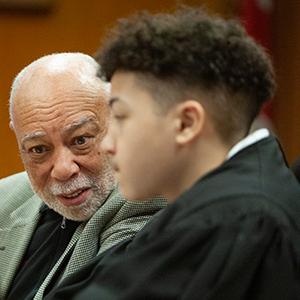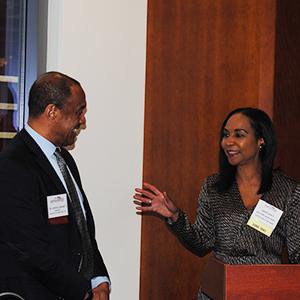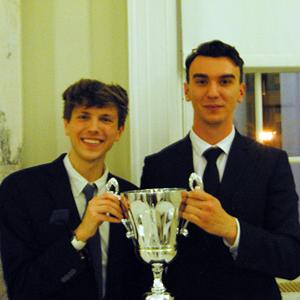From Managing Money to Telecommuting, Practice 360° Addresses Ethical Snares for D.C. Lawyers
October 12, 2023
From left to right: D.C. Bar Regulation Counsel Hope Todd and Erika Stillabower with Dan Schumack
When attorneys licensed in the District of Columbia reach out to the D.C. Bar ethics hotline for confidential advice, there are those who are “surprised to learn that they’ve done something that our ethics counsel thinks is horrendous,” said Dan Schumack, partner at Schumack and Guggenheim PLLC and a member of the D.C. Bar Legal Ethics Committee.
Schumack, one of the featured speakers at the D.C. Bar Practice Management Advisory Service’s ninth annual Practice 360° on October 4, joined D.C. Bar Associate Director of Legal Ethics Hope Todd and D.C. Bar Senior Legal Ethics Counsel Erika Stillabower on a panel discussing everyday legal practice scenarios where solo or small firm lawyers may unintentionally find themselves in hot water and lose their license.
“Some of those surprises are coming out when you call the ethics hotline. You might call thinking you've got problem X. And when you describe your situation to the folks on the hotline, they'll say, ‘Well, actually you have problems X, Y, and Z,’” Schumack told attendees.
During the session, Schumack and others focused on the sometimes confusing and complicated aspects of properly managing client money and payments, telecommuting, and serving as local counsel for outside lawyers.
Managing Money
In the District of Columbia, the handling of client funds and client payments for work performed is governed by D.C. Rule of Professional Conduct 1.15. The D.C. rule is similar to the American Bar Association’s model rule on safekeeping property, with one key difference, Schumack said.
“We've got an exception built into our Rule 1.15 that says if you can get your client to give you their informed consent, the client can authorize you to [treat a pre-payment as your own] before you actually start the work,” he noted.
How the funds are handled depends on whether it is a prepayment, an hourly fee, or a retainer. “We've got a mechanism through contract that would allow you to get your client to agree that certain events will be worth a certain amount of money,” Schumack said. “What those events are might be different in every area of practice. It might be different with every client. Whatever those payments are described as, [the caveat] needs to have a coherent rational nexus to the work you do.”
Unauthorized Practice of Law
D.C. Court of Appeals Rule 49, which governs the unauthorized practice of law in the District, was revised last year to provide greater clarity around telework for lawyers not licensed in the District. Todd discussed the practical implications for District lawyers who may be working from home in Virginia or Maryland.
Teleworking from another state through an office in Washington, D.C., for lawyers admitted to the D.C. Bar is not a problem under Rule 49, Todd said, but rather, attorneys need to be careful and specific about how they handle remote work because there is no universal standard for what constitutes the unauthorized practice of law and they need to comply with rules of the jurisdiction from which they are working, such as Virginia or Maryland.
“If you are going to do any work in a state where you are not licensed, or if you're going to do work in a jurisdiction where you are licensed but for a client or a state matter for which you are not licensed, you need to look at the individual laws and rules governing those effective jurisdictions because they vary and they vary dramatically,” Todd said.
“Most of these regulations seemingly were written in a time before the telephone, much less the ability we have to practice law from space today. The [regulations] have not kept up with reality,” she added. “The pandemic certainly shot us way ahead, and what we saw was jurisdictions scrambling so that lawyers could operate in the real world. But that wasn't solved completely, and they're still trying to deal with those consequences.”
Service as Local Counsel
Questions about supervision of pro hac vice attorneys by local counsel have also become more frequent since the prosecutions of January 6 protestors at the U.S. Capitol.
“There's always been a fairly steady stream of issues arising when lawyers are serving as local counsel, and it can be anything from a breakdown in the relationship with lead counsel or just concerns about other issues,” said Stillabower. Often, local counsel doesn't have a direct relationship of trust with the client, making it trickier sometimes to resolve concerns when they arise.
“Those types of calls [to the ethics hotline] really peaked during the January 6 prosecutions because there were so many criminal defendants in the District of Columbia coming in with attorneys from outside the District who needed local counsel to assist in getting those new counsel access to the courts through pro hac vice admission,” Stillabower said.
The requirements for supervision of a pro hac vice attorney by local counsel were revised as part of the Rule 49 update in 2022, with “supervise” redefined to mean “to make reasonable efforts to ensure that another person conforms to the applicable Rules of Professional Conduct.





